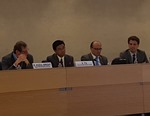Social Watch News
Published on Fri, 2017-11-10 16:59

Photo: Creative Commons
License/Manuel
|
Water is a key concern in Mexico, where 100 civil society organizations submitted a joint report to the UN documenting how “privatization policies benefit extractive industries and mega-projects instead of reducing inequalities in access to essential services”. Users with difficulties in paying the increased tariffs are being denied their human right to water and the quality of the water distributed has deteriorated so much in many places that in Aguascalientes 95 percent of the water people drink is bottled.
The report points out that water issues affect women disproportionately. “When there is a shortage, irregular delivery or bad quality water, women spend more time to bring water to their homes, boil it, filter it and deal with the authorities, frequently adding up to 30 hours a week to their domestic work.” The Mexico Social Watch report emphasizes that “insufficient and ineffective regulations on environmental and social impact, have led to numerous cases of violation of fundamental rights due to business activities”.
|
Published on Fri, 2017-11-10 16:55
In Egypt the World Bank argues that the gains in mortality rates and life expectancy levels achieved since the beginning of the last century will not continue if the private sector is not involved, due to the government's failure to devote more resources to the health sector and a lower possibility of improving unhealthy daily habits of poor people.
The Social Watch report notes that while the government has announced the creation of PPPs in the Smouha Maternity University Hospital and Blood Bank and Al Mowasat Hospital, the PPP central unit has not made public the details of the projects, nor the nature of the investors’ responsibilities. Nor has it announced the main investors in the projects or the improvements that they are expected to achieve. All that is known by civil society is that the PPPs will be implemented and partially managed by Bareeq Capital, DETAC Construction & Trading, Siemens Healthineers and G4S Company.
|
|
Published on Fri, 2017-11-10 16:48
|
Published on Fri, 2017-11-10 13:09
The informal economy comprises half to three-quarters of all non-agricultural employment in the developing countries, Roberto Bissio, coordinator of the Social Watch international secretariat in an article on "Past and future of informal workers" published by the Arab NGO Network for Development as part of its report on informality in the Arab region.
The study combats the notion that informality in developing countries is associated with "traditional" or "backward" sectors in the economy, and exposes as contributors to present-day informality the pressure to reduce the state and its control by international financial institutions like the World Bank, the benefits obtained by multinational corporations from cheaper labour and flexibility in workers' contracts and the "uberification" of the economy through online outsourcing of small pieces of work.
|
Published on Fri, 2017-11-10 12:46

Photo: South Centre
|
The third meeting of the open-ended inter-governmental working group (OEIWG) for the elaboration of a treaty to make transnational corporations accountable for their human rights violations was held at the United Nations in Geneva last October. 101 countries attended the meeting, the largest number since the discussions started two years ago.
After the 3rd session of the OEIWG, the process will continue moving towards developing a negotiating text for a draft legally binding instrument on business and human rights. The Chairperson-Rapporteur had stressed that “the mandate from the UN Human Rights Council is clear…the working group should continue working until it reaches a legally binding instrument…there is absolutely no ambiguity as to the nature of the mandate”. He underlined the historic nature of the process, pointing out that it “addresses one of the major problems of the global social contract in the 21st century”.
|
|
Published on Fri, 2017-11-03 17:34
|
Published on Fri, 2017-11-03 12:27

Photo: Times of Malta
|
The lack of any substantive cohesion in Malta between a number of policies, such as education or health, with sustainability is a worrying factor, according to the Maltese Social Watch report. The general absence of statistical data, particularly of disaggregated data by various social and economic criteria, resulting from a lack of collection or from the prevalent praxis of not making it public makes the reporting difficult. Yet, there is an obvious lack of coherent and comprehensive approach to the legal and policy framework relating to the SDGs. This also belies a weak vision both on the action required at a national level and in terms of Malta’s role within the international community and its contribution (despite it being a small country) at the global level.
|
Published on Fri, 2017-11-03 12:20

Photo: Christopher Irwin /
Creative Commons License
via Flickr
|
In Morocco, the Social Watch team informs, the kingdom’s supreme auditing body has reported a systematic lack of compliance with their contractual obligations by private providers of public services in water, electricity and sanitation: In the city of Tangier, the “Amandis” Group, affiliated to the French group “Veolia”, carried out less than one third of its commitments during the first five years of its operations. In Casablanca, only 45,806 ‘social connections’ (benefiting people in poverty) were carried out in 10 years (1997-2006) out of 90,000 promised by the French company Lédique of the Suez group.
|
Published on Fri, 2017-11-03 12:04
The Global Justice Center, the Eyzidi Organization for Documentation, the Iraqi Al-Amal Association, the Iraqi Women Network, Madre and Yazda sent an open letter addressed to Prime Minister Haider al-Abadi, to the chief of High Judicial Counil and to Mr. Ibrahim Jaafari- Foreign Minister regarding the Terms of Reference for UN Security Council resolution 2379 (2017) on Daesh accountability.
The CSOs demand that those ToR, which are currently being drafted, have a gender justice and a victim-centered approach. In particular, the recommendations stresses the need for identifying an applicable legal framework for war crimes, crimes against humanity and genocide, legal reform, ensuring investigative efficiency, gender expertise, due process, victim and witness protection, community outreach and civil society engagement.
|
Published on Fri, 2017-11-03 11:31
A recently launched report by the Arab NGO Network for Development aims at defining the gender dimensions of informal labor in the region. The study on the gender dimensions of informal labor, written by Dr. Howaida Adly, Political Sciences Professor at the National Center for Sociological and Criminilogical Research (Egypt), focus on commonalities between all Arab countries in terms of labor and gender, and on the differences among them. The analysis is based on national reports received from the different Arab countries. A common limitation is that data is lacking to allow for a comprehensive assessment of the gender dimensions of informal labor.
|
SUSCRIBE TO OUR NEWSLETTER
Submit

|










